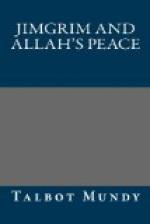However, first I must tell how I met him. There is an American Colony in Jerusalem—a community concern that runs a one-price store, and is even more savagely criticized than the British Administration, as is only natural. The story of what they did in the war is a three-year epic. You can’t be “epic” and not make enemies.
A Chicago Jew assured me they were swine and horse-thieves. But I learned that the Yemen Jews prayed for them—first prayer— every Sabbath of the year, calling down blessings on their heads for charitable service rendered.
One hardly goes all the way to Palestine to meet Americans; but a journalist can’t afford to be wilfully ignorant. A British official assured me they were “good blokes” and an Armenian told me they could skin fleas for their hides and tallow; but the Armenian was wearing a good suit, and eating good food, which he admitted had been given to him by the American Colony. He was bitter with them because they had refused to cash a draft on Mosul, drawn on a bank that had ceased to exist.
It seemed a good idea to call on the American Colony, at their store near the Jaffa Gate, and it turned out to be a very clean spot in a dirty city. I taxed their generosity, and sat for hours on a ten-thousand-dollar pile of Asian rugs behind the store; and, whatever I have missed and lost, or squandered, at least I know their story and can keep it until the proper time.
Of course, you have to allow for point of view, just as the mariner allows for variation and deviation; but when they inferred that most of the constructive good that has come to the Near East in the last fifty years has been American, they spoke with the authority of men who have lived on the spot and watched it happen.
“You see, the Americans who have come here haven’t set up governments. They’ve opened schools and colleges. They’ve poured in education, and taken nothing. Then there are thousands of Arabs, living in hovels because there’s nothing better, who have been to America and brought back memories with them. All that accounts for the desire for an American mandate—which would be a very bad thing, though, because the moment we set up a government we would lose our chance to be disinterested. The country is better off under any other mandate, provided it gives Americans the right to teach without ruling. America’s mission is educational. There’s an American, though, who might seem to prove the contrary. Do you see him?”
There were two Arabs in the room, talking in low tones over by the window. I could imagine the smaller of the two as a peddler of lace and filigree-silver in the States, who had taken out papers for the sake of privilege and returned full of notions to exploit his motherland. But the tall one—never. He was a Bedouin, if ever a son of the desert breathed. If he had visited the States, then he had come back as unchanged as gold out of an acid bath; and as for being born there—




